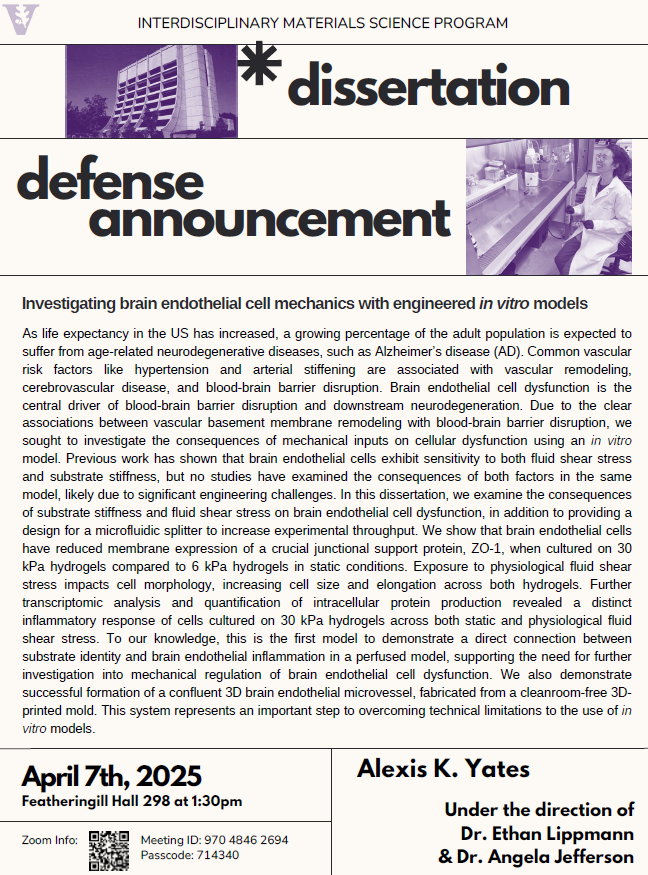 DISSERTATION DEFENSE
DISSERTATION DEFENSE
Alexis Yates, Interdisciplinary Materials Science
*under the direction of Ethan Lippmann and Angela Jefferson
“Investigating brain endothelial cell mechanics with engineered in vitro models”
04.07.25 | 1:30PM | 298 Featheringill Hall | Zoom: 970 4846 2694 Passcode: 714340
As life expectancy in the US has increased, a growing percentage of the adult population is expected tosuffer from age-related neurodegenerative diseases, such as Alzheimer’s disease (AD). Common vascularrisk factors like hypertension and arterial stiffening are associated with vascular remodeling,cerebrovascular disease, and blood-brain barrier disruption. Brain endothelial cell dysfunction is thecentral driver of blood-brain barrier disruption and downstream neurodegeneration. Due to the clearassociations between vascular basement membrane remodeling with blood-brain barrier disruption, wesought to investigate the consequences of mechanical inputs on cellular dysfunction using an in vitromodel. Previous work has shown that brain endothelial cells exhibit sensitivity to both fluid shear stressand substrate stiffness, but no studies have examined the consequences of both factors in the samemodel, likely due to significant engineering challenges. In this dissertation, we examine the consequencesof substrate stiffness and fluid shear stress on brain endothelial cell dysfunction, in addition to providing adesign for a microfluidic splitter to increase experimental throughput. We show that brain endothelial cellshave reduced membrane expression of a crucial junctional support protein, ZO-1, when cultured on 30kPa hydrogels compared to 6 kPa hydrogels in static conditions. Exposure to physiological fluid shearstress impacts cell morphology, increasing cell size and elongation across both hydrogels. Furthertranscriptomic analysis and quantification of intracellular protein production revealed a distinctinflammatory response of cells cultured on 30 kPa hydrogels across both static and physiological fluidshear stress. To our knowledge, this is the first model to demonstrate a direct connection betweensubstrate identity and brain endothelial inflammation in a perfused model, supporting the need for furtherinvestigation into mechanical regulation of brain endothelial cell dysfunction. We also demonstratesuccessful formation of a confluent 3D brain endothelial microvessel, fabricated from a cleanroom-free 3D-printed mold. This system represents an important step to overcoming technical limitations to the use of invitro models.